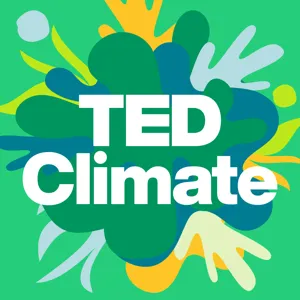Podcast Summary
Exploring innovative tools and platforms for climate action and business growth: Tools like Countdown podcast, TED Audio Collective, Canva AI, Slack, and Climate 1 podcast can help individuals and businesses adapt to climate change and streamline operations, enabling progress towards a sustainable future.
There are innovative tools and platforms available to help individuals and businesses adapt to the challenges of a changing climate and growing workloads. Frida Pinto introduced the Countdown podcast and the TED Audio Collective, emphasizing the importance of addressing climate change. Rebecca Henderson's talk at the Countdown global launch event presented ideas for businesses to invest in sustainable solutions using free and fair markets. Canva's AI tools can help create presentations quickly, saving time for growing businesses. Slack is another tool that streamlines communication and automates routine tasks, allowing businesses to focus on growth. The Climate 1 podcast offers insights from experts, activists, politicians, and artists on the climate crisis and the ways our world is responding. By utilizing these resources, individuals and businesses can make progress in addressing climate change and growing their operations efficiently.
Markets not reflecting true costs of climate change: Climate change causes significant harm to the environment and human health, but current market prices do not accurately reflect these costs, leading to unfair consequences and catastrophic outcomes
Climate change is causing devastating damage to the environment and human health, and this damage is not reflected in the prices of goods and services that contribute to greenhouse gas emissions. The speaker, an economist and business school professor, argues that markets only function effectively when prices reflect real costs. However, currently, firms that sell fossil fuels and emit greenhouse gases are not held accountable for the harm they cause to the environment and human health. This is not only unfair but also leads to catastrophic consequences, such as the death of over 160,000 people since 1998 due to extreme heat. The speaker emphasizes the importance of addressing this issue and ensuring that prices accurately reflect the true costs of goods and services to mitigate the negative impact of climate change.
Hidden costs of coal-fired electricity: Coal-fired electricity's true cost is $16/kWh due to health and climate damages, but is only charged $10, giving subsidized firms an unfair market advantage.
The true cost of producing coal-fired electricity is significantly higher than the $10 we pay, with at least $16 in hidden costs for human health and climate damage. The same goes for other industries contributing to environmental harm, such as burning oil and gas and eating beef. These costs are unfairly borne by society, giving heavily subsidized firms an unfair advantage in the market. The situation is not sustainable, as the consequences of climate change will have severe economic and social repercussions. Businesses have a vested interest in addressing this issue, as the future of free enterprise is at stake. While governments need to take action, businesses can lead the way by acknowledging and addressing the externalities they create. This will require transparency, accountability, and a commitment to reducing emissions and minimizing harm to the environment and public health.
Transforming the Garbage Industry with Ethical Business Practices: Former private equity exec Eric Osmundson overcame challenges to create a leading recycling business in Scandinavia by prioritizing ethical practices, reducing emissions, and eliminating illegal dumping.
Eric Osmundson, a former private equity executive, transformed the garbage industry by refusing to compromise on ethical business practices despite initial resistance. His commitment to reducing emissions and eliminating illegal dumping faced significant challenges, including employee turnover, customer loss, and industry backlash. However, by persisting and bringing corruption to light, Eric's company, Norsk Genvinning, became a leading recycling business in Scandinavia. This story illustrates four essential elements for driving change: establishing a profitable business model, persuading competitors to follow suit, securing investor support, and advocating for regulatory reform. By promoting fair and free markets, we can address climate change and ensure that no one can exploit the system at the expense of the environment and society. It's up to us as customers, employees, investors, and citizens to collaborate and make a difference.


